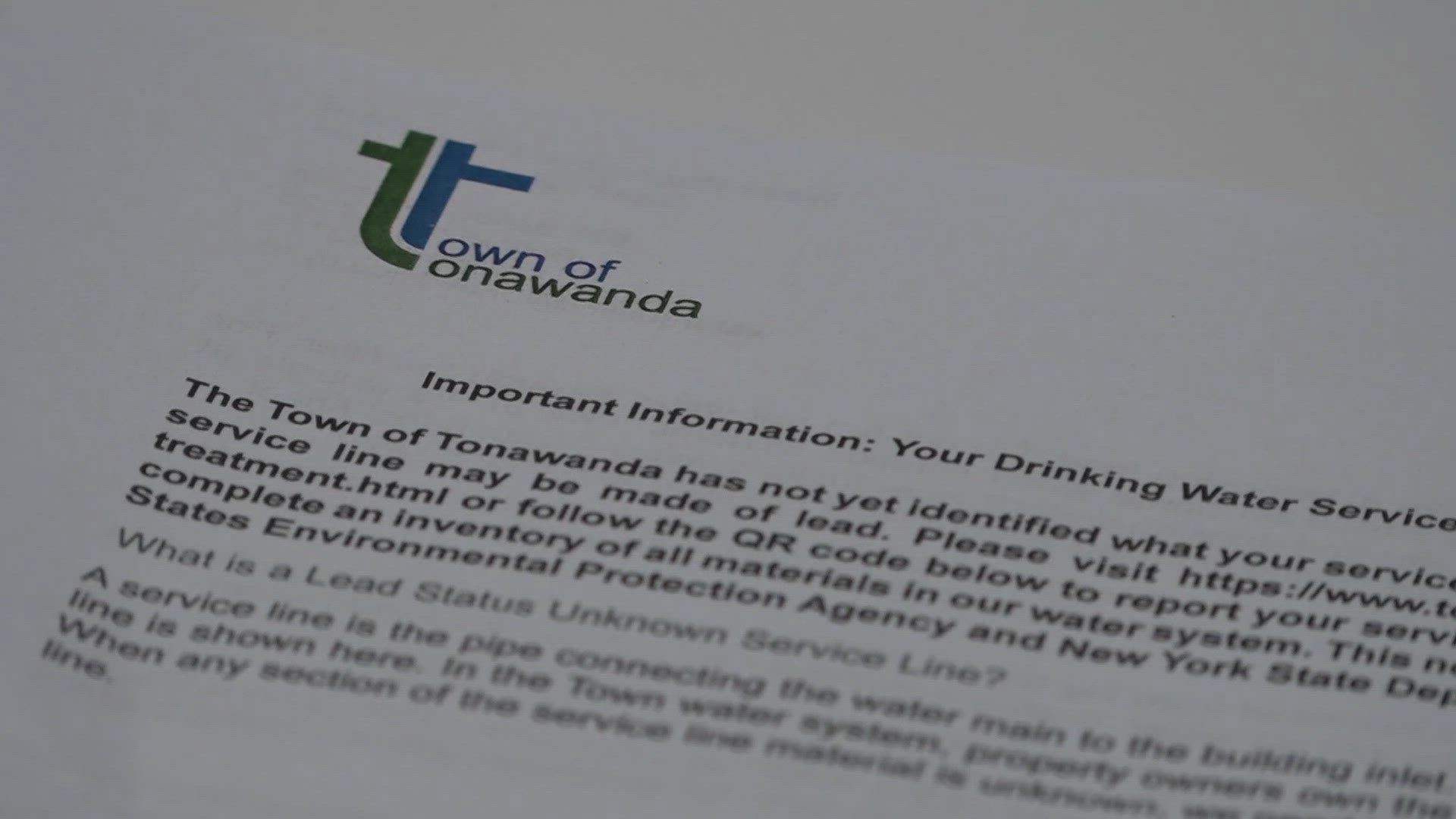KENMORE, N.Y. — The issue of lead pipes in America's water infrastructure has sparked a nationwide effort from the EPA to have local municipalities and water authorities work to identify and remove lead service lines.
It's an effort that started in Tonawanda and across WNY months ago but only recently became publicly known when several thousand letters were sent out to water customers seeking to take an inventory of what each water service line is made of.
"We're just a little cog in the wheel so to speak because this is going on nationwide," said Town Supervisor Joe Emminger.
For homeowners, it is a critical step toward ensuring safe drinking water that has also sparked a lot of questions and some concerns.
Kevin Lobaugh recently received a letter for his house in the Village of Kenmore indicating that the material of his water service line is unknown.
"It basically said your pipes may or may not contain lead so it'd be nice to know," Lobaugh said.
Whether in Kenmore, Tonawanda, or the Erie County Water Authority's service area, the letters are all similar and come in three varieties. They will indicate that a service line is known to be 1) lead 2) galvanized steel or 3) if the material is unknown.
"We’re trying to bring to the attention of the customer, per the regulation from the EPA, what type of service is providing water to their home," said Len Kowalski from the Erie County Water Authority. The goal is to help residents understand whether their service line poses a risk due to lead contamination or if they have nothing to worry about.
Anna and Rob Amberger recently moved to Kenmore and have seen a lot of chatter in the local Facebook group about the letters, wi and Rob Amberger, reassured residents that the effort is part of a larger, nationwide initiative to replace aging infrastructure over time.th some people expressing frustration and questioning why the burden is falling on homeowners when municipalities don’t have definitive records.
"I'm definitely interested to find out what our pipes are made out of... and hoping some more guidance could come out so people like us who do need a little more guidance can take care of that situation," Anna Amberger said.
The long-term objective from the EPA is for water authorities and municipalities to replace all lead service lines, which bring water from the street into people's homes at the latest by 2037.
The Erie County Water Authority is optimistic, however, hoping to complete the task within three years at an estimated cost of $75 million to be paid for using grants, other state and federal dollars, and by ratepayers.
According to Kowalski the ECWA has identified approximately 200 lead service lines but estimates when all 12-15% of its unknown lines are inspected that number will be closer to 6,000.
In Tonawanda, Supervisor Emminger told 2 On Your Side that early estimates by the water department suggest the problem is minimal for them, with only 4 out of 11,000 homes found to have lead pipes.
"We’re pretty confident it’s going to be a very small problem," Emminger said.
The same can not be said for the City of Buffalo and other areas with older water infrastructure.
Buffalo Water has started sending out its letters to customers including 34,115 Known Lead Service Line Letters, 35,705 Unknown Service Line Letters, and 118 Galvanized Requiring Replacement Letters.
Residents are urged to carefully review the letter they receive in the mail, which outlines essential information and recommended actions based on their property's service line status.
Both the Buffalo Water Board
and ECWA have mapped out all known service lines in their areas noting lead, galvanized, unknown, or the preferred copper/plastic. Customers can type in their address into both and verify their service line status.
For those wondering about their service line material if they did not receive a letter or want to verify what may already be known, Kowalski suggested a few DIY tests: Scratching the pipe with a key can reveal whether it's copper, while a magnet test can identify galvanized steel. If the key test leaves an indent and the magnet doesn’t stick, there’s a chance the line could be lead.
Testing our water is another way to find out if your service line is lead. Buffalo residents can call 311 and receive free water testing kits. The Erie County Water Authority will test homeowner's water if they reach out with concerns.
The Village of Kenmore directs neighbors to Pace Analytical for testing and Tonawanda advises customers to email waterquality@tonawanda.ny.us if they'd like to receive more information.
If you have not received a letter chances are your service line is safe and made of copper or plastic but if you too are unsure and have questions the best thing to do is contact your local water provider.
The Erie County Water Authority customer service number is (716) 849-8444. You can also email info@ecwa.org.
EDITOR'S NOTE: AI was used to correct the case of this story and format it for online publishing.

